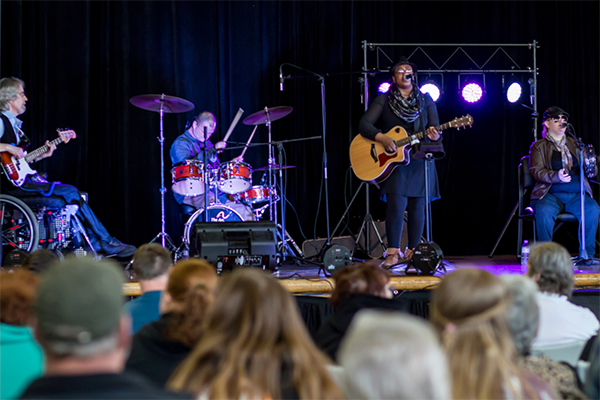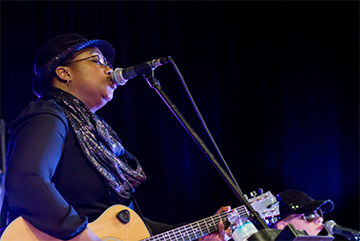
10/14/2024
As a small child Michelle King’s speech was very limited. Doctors diagnosed her with autism and an intellectual disability and told her mother she would probably never be able to have a normal conversation.
But King could sing. From that foundation, a speech therapist worked with her to develop her language skills. And then some.
King became the founder, lead vocalist and guitar player for Flame, a classic rock and pop cover band that has performed in Europe and Asia, and at legendary U.S. venues like the Apollo Theatre in Harlem.
The U.S.- based group, which describes itself as a band with “talented members who happen to have disabilities,” will bring their music to SUNY Cortland for a two-hour concert on Saturday, Oct. 19 at 6 p.m. in the Corey Union Function Room.
“Part of their goal is to address how the public perceives people with disabilities, to increase public awareness and acceptance,” said Suzanne Sprague, director of the Disability Resources Office. “And also, they’re just a really fun band.”
This free public performance is a collaboration between the Campus Artist and Lecture series and the Disability Resources Office. Even though the event is free, tickets are still required and are available in the Campus Activities Office, Corey Union, Room 406, weekdays from 8:30 a.m. to 4 p.m. or at the venue beginning one hour before start time. Tickets can also be reserved by calling 607-753-5574.
Flame formed 20 years ago at the Arc Lexington in Gloversville, N.Y., an agency that supports people with developmental disabilities. Since then, the musicians of Flame have released six albums and two singles. Their live setlist includes original tracks and more than 100 cover songs that span the last 50 years.

“It’s a band that does a lot of performances where people feel like they want to get up and dance,” Sprague said. “There'll be a fun social opportunity and I hope that people get to experience this really unique and talented group of people.”
The group’s musicians have disabilities including Down syndrome, cerebral palsy, autism, blindness and paralysis.
The band has been honored by the National Historic Recognition Project, a collaboration of national and regional organizations that recognized key groups and individuals who contributed to the transformation of the field of intellectual and developmental disability within the United States.
Most recently, they were invited to tour Cambodia by the United States Embassy as part of the United States Arts Envoy program.
Sprague, who has heard great reviews about Flame from other SUNY schools, credited Katie McCulloch, the former assistant director of the Disability Resources Office, for doing a lot of the work in getting Flame to Cortland.
“We were interested in promoting an opportunity like this,” Sprague said. “Both because of the reputation of the band and because it's aligned to office goals of increasing the amount of disability related programming around campus, reaching new audiences within our own Cortland community and giving folks a chance to learn about and engage with the topic of disability.”
SUNY Cortland was recently named to a list of the best “disability-friendly schools” in the country. Sprague has said that her department’s goal is to make improvements in accessibility that are felt in day-to-day life at the university, including everything from campus housing and service animals to online learning and note-taking technology.
Sprague noted the Flame concert is supported, in part, thanks to new funding for Cortland in the state budget that’s focused on supporting the needs of students with disabilities. Cortland received $414,100 as part of a SUNY-wide initiative announced by Governor Kathy Hochul and Chancellor John B. King Jr.
The money will help the Disability Resource Office hire a new assistant director and has already led to the hiring a new learning strategist. It will also be used to increase accessibility on campus through programs and initiatives.
“Our recent focus groups with our campus community’s participation provided specific feedback and we are taking steps to respond to the requests for changes that were shared with us,” Sprague said.
Her examples included the addition of new automatic door openers in certain locations on campus; assessment of the need for additional accessible parking on campus; and a concerted effort to improve the student experience for using accommodations on campus by understanding what hasn’t gone well.
“We want to make changes that will be impactful as we think about all our students with disabilities and having an inclusive campus.